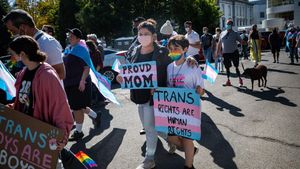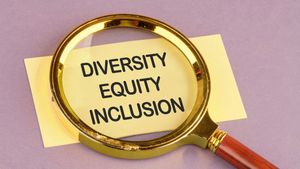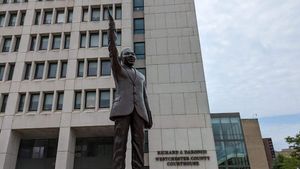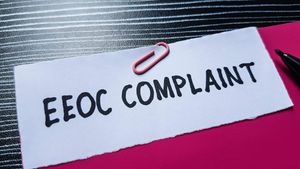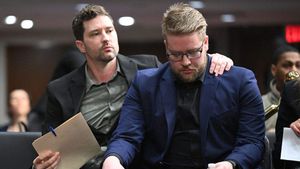With the vaccine rollout picking up speed here in Alabama, we can feel hopeful that the end of the pandemic is in sight. It’s safe to say that all of us are ready to say goodbye to the worry, pain, and isolation that has defined so much of our lives over the last year. As we close this terrible chapter, let’s commit to ensuring that no one in our community will ever again face the devastating sense of isolation that so many of us endured during COVID.
As the executive director of Goodworks, a harm reduction organization in Huntsville, I work with people who are no strangers to isolation. Many of our clients have been shunned by their families and communities thanks to anti-LGBTQ stigma and misconceptions about people living with HIV.
Now, more than ever, we can be clear that this is a time for our communities to stick together. No one should be discriminated against because of who they are, who they love, or their health status. That’s why I’m calling on Congress to support the Equality Act, common sense bipartisan legislation that would update federal law to include express and enduring nondiscrimination protections for 13 million LGBTQ Americans across virtually every area of daily life.
A vast majority of LGBTQ Americans report facing discrimination in their everyday lives, and for people living with HIV, the chance of experiencing anti-LGBTQ discrimination is unfortunately even more likely. For them, these protections are even more crucial. Here in Huntsville, I regularly work with clients who have been fired from service sector jobs because their employers worry that customers will be judgemental of their HIV positive status. I remember an instance in which a client was working at a tattoo shop — not doing tattooing or piercing — and was fired simply because a rumor circulated that they were HIV positive. In this and many other cases, employers chose to unfairly fire these workers instead of educating their customers. The passage of federal nondiscrimination legislation would send a clear message that no one should be fired from their jobs for who they are, who they love, or their health status.
Employment discrimination is not the only issue we face. Far too many LGBTQ Americans living with HIV are denied housing or are evicted due to discrimination. That leads to an increase in homelessness — and in some areas, LGBTQ and HIV positive people are even denied emergency shelter. Here in Huntsville, most of our shelters are religious shelters that are exclusionary to HIV positive and LGBTQ people. A few years ago I had a transgender client in need of a place to stay. Their only option was a warming center, which was only open during cold weather. People of transgender experience don’t have much recourse for shelter in Huntsville, and with transgender folks disproportionately affected by HIV, we should be clear that this is a form of discrimination that can deeply impact a person’s health and well-being.
We should also be clear that medical discrimination is a betrayal of our communities. LGBTQ Americans living with HIV often face barriers to receiving preventative care due to anti-LGBTQ discrimination and the stigma around living with HIV, which makes them more susceptible to health complications and other illnesses. It’s critical that we challenge stigma in Huntsville and across Alabama. In the rural deep south, anonymity is impossible. Our neighbors know when someone is going to the clinic, or getting medications from the pharmacy regularly. And in many cases, access to LGBTQ-friendly and HIV-competent care is limited. For these reasons, many LGBTQ folks prefer to go to the AIDS service organization clinic than a regular doctor, even if they don’t have HIV or AIDS. While we work to expand rural health care and reduce stigma, we can also advocate for peer-delivered HIV testing and peer-delivered counseling to reduce the number of people traveling to clinics and hospitals. At the same time, we should be advocating for federal nondiscrimination legislation to protect LGBTQ Americans from medical discrimination.
Equality is not a Democratic or Republican value, it’s an American value. Everyone should be free to go about their daily lives — go into a store, check into a hotel, clock in at work, go to the doctor — without fear of harassment or discrimination. Because of the pandemic, we now all know a little bit what it is like to be isolated from family and friends, to be estranged from our community. We should be careful not to isolate people living with HIV due to stigma that doesn’t have any real basis in medical fact.
Morgan Farrington is the executive director of Goodworks, a harm reduction services and community resources hub in Huntsville, Ala.


































